| Lista Light |  |
GREENING UP OUR SHIP!!!
This section chronicles our task in preparing a tried and tested 50’ Wooden Gaff Ketch for the trials of Ocean passages and the rigmaroles of sustaining our ethical stance. Everything from canned food to engine oil has a strict set of criteria to meet, and where compromises have been made it has always been done with a grave heart but an unending interest in finding a “better” way. If you have any thoughts or suggestions as you read through then please do drop us an email/call – we are learning all the time in our approach to the new world of boat living, there is no manual.
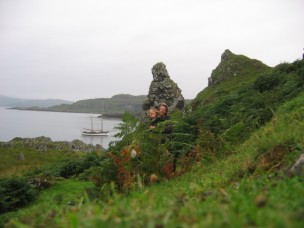
Our priority is to travel in a sustainable and respectful way whilst keeping using a mix of old and new technology to meet this goal, safety coming near second, of course. In fact our crew react to a mix of astonishment, foreboding and disbelief as Katharine takes new members of the crew through the strict recycling procedure well before I have ever considered to share the man-over-board drill!
As detailed in the history section, Lista Light, at a ripe old 70 plus, has seen plenty of action in her time and is well equipped already for the voyage. Our task is more provisioning and "Greening Up" our ship ready for new adventures and keeping the old girl in good condition so she continues to return the favour!
1. STEAM
Diesel. Dirty old diesel. The art of sailing in todays crowded waters and busy schedules has been revolutionised by the advent of Auxiliary power commonplace in sailing vessels from the 1930s onwards. An Engine. It means entering a harbour in any wind condition is possible, you can buck the Corryvreken, burry your nose into a storm or press on to your favoured destination to meet crew and a pint by 6pm. For this convenience there is an obvious environmental cost - the “Iron Topsail” on Lista Light is a 6-cyclinder Perkins. With an ample 35 tonnes to shift, she drinks a reasonable volume of diesel and that gives us something to think about.
It seems there are two approaches – abandon the engine altogether and return to sails only, or to use the engine in a measured and restricted way. Harbours are more crowded these days and it is no coincidence that less ships are lost with the ability to avoid tricky rocks, so, we decided to take the hit of carrying an engine. To justify this choice its worth bearing in mind that the average RNLI Trent lifeboat consumes 500 litres per hour, one callout and our well meaning gesture would have been thoroughly outweighed.
Lista Light is not easy to manoeuvre under engine in a tight spot never-mind sail. So we minimise its use instead. And for that comes frustration but an easy conscience. We spent 4 hours off the Isle of Jura doing 0.4kts; 6 hours off Cardigan bay at 1.4kts; high pressure over the UK for 4 days meant we stayed in port at Fishguard and got into all sorts of trouble with a wee drink instead . . . We look forward to the trade winds!
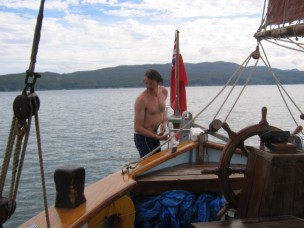
With the old Gaffers bible, "Hand, reef and Steer", by Tom Cunliffe in the oil skin pocket, we are starting to master the art of close quarters sailing in a very heavy bath tub.
2. POWER
On board power is a major consideration for Lista Light as she has grown up from an age of the sextant and the Walker Log to the modern day in which Navigational equipments hums, purrs and beeps all around the helm and nav station. Gone too are the days of Paraffin navigation lights and saloon ambience to the ever-ready supply of electric lighting. The old wooden lathe replaced by Mr De Walt. We have brought back the old plane, but we do need power to fill the 12 Tractor Batteries on board and whilst we can and occasionally do lift the 4okg CQR Anchor up by hand, it’s nice to have the odd AMP of helping hand too. Lista needed an upgrade in this respect. She made most power via diesel in a handy 5KVA Lister Generator drawing from the diesel tanks but with a plethora of micro renewable on offer we went to the drawing board with her production capabilities.
Options in the Marketplace:
a. SOLAR
b. WIND
c. HYDRO
Most modern craft will opt for either wind or solar, we wanted to have a broad capability of power production to meet all weather conditions, and to have experience of all methods in order to talk and write with authority on this topic close to our hearts. So in the end we went for all of it.
SOLAR: Recently wedded, we received an extra 20Watt Solar panel from the John and Laurie Lowries of the family (oracles on this topic and all others to do with life on boats of the vegetative variety " Masters and Commanders "Dolphin" of Leith, Scotland) which we have married up with another identical panel delivered to Oban, Scotland, to meet our 24v system. With this additional 40Watts, and our current 2*30Watts we have 100Watt of solar. Useful, as I write today with a cloud laden sky blanketing the beautiful Tobermory, Isle of Mull, Scotland. Oh well, head south ‘til the butter melts as they say....
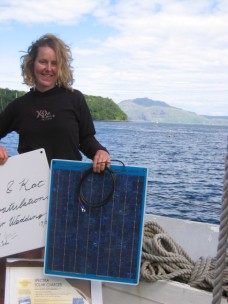
WIND/HYDRO: We have good friends Jake and Ruari in the wind trade and so getting facts and advice on this was easy. Wherever there is sailing there is wind, so its just a matter of selecting the type. Immediately it makes sense. Lista Light is a traditional ship and to saddle her with a permanent fixture atop the mizzen mast would cause her original builders to choke on their rollmops and anything lower makes the device very nickable. We instead opted for a temporary structure deployable in the right conditions. So we ended up talking to a company called Boost Energy Systems, providers of Aquair 100, a generator which can be temporarily suspended up the rigging to provide the benefits of elevation whilst mounted in a bracket.
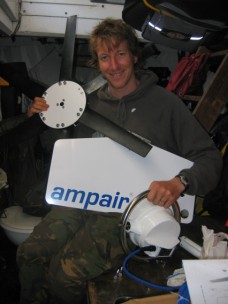
And the real joy of this system was that it could also be deployed as a Tow Generator too, which means that on passage we can harness the strong pull of Lista Light through the water (with minimal additional drag given her sizable dimensions anyway). The Suppliers have put up with my considerable interrogation so far and with some parts en route with Lowrie parents, we will have a highly adaptable system. Each of the parts are on separate Ammeter readers and so we will demonstrate the fact behind the relative contribution of the two solar banks and the wind/water generator.
I think that the Hydro component will prove to be the real provider – hydraulic power being far superior to pneumatic. Every modern boat has a propeller that, depending on gearbox, can be allowed to serve whilst the boat is in motion, driven by the pull through the water. The Aquair 100 systems comes with its own propeller but in fact, I believe, could be mounted aside the prop shaft without a significant reengineering project.
d) THIRD GENERATOR
We have the Lister Generator, the Aquair 100 Generator - Our plan is to harness the third generator on board, the Homo Sapiens, lounging on her decks both on passage and in the harbour! We have acquired a second hand rowing machine from the our Devon mates the Bloomfields and we will rig up a mounting to drive the generator to charge the batteries, ridding passengers of pent up energy and giving us all a good anaerobic workout!
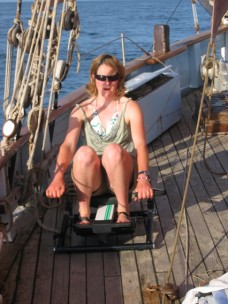
The generator lends itself more to a cycle enhancement (we have two bikes on board awaiting adaption) but for a full body workout our mission is to link up the rowing machine...
3. USE LESS
Use Less, not useless. Frugality is king on board all closed systems - a boat is a good example of this (as is the world, arguably). Much less sexy than dealing with the production side, reducing consumption of limited resources is an experience all people should share to understand the impact of their existence. I have long been a proponent of helping people understand their consumption better in their homes and workplaces- all the technology exists today.
a) LEDs for Lighting (Nav lights and reduces Wattage from 20 to 2.6 in some cases)
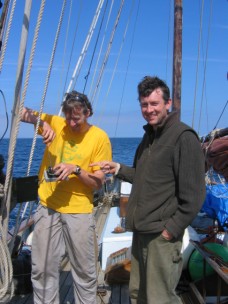
b) Hand Pumps for shifting water through our water tanks, instead of the MaxiPuppy electric pump, which has rather conveniently died anyway. It’s also a fairly strenuous experience which all crew are encouraged to undergo to feel the impact of their consumption!
c) Hot water Solar shower. (Our onboard shower can also be used, but requires filling a canister and transporting to the shower rather than plumbing in the shower, in the name of economy).
d) 24v System instead of 12v – reduces the wastage in transporting energy around the boat
e) Jumpers. We have a diesel gravity fed heater but we do not use this at all, just throw on a jumper!!
f) Water - no longer a free resource and certainly an energy cost in its purification and transport. We have the capacity to take on over 1000 litres. That lasts us a month with 8 people, which equates to 5 litres/day/person. Basically, shower when the garlic laced meals require it, a teaspoon of water for tooth brushing, mix sea water 30% for boiling soluble food stuffs (pasta/rice) and 100% in veg. Oh, and save a bit in case the wind doesn’t blow . . . .
4. SPA TREATMENT
Sadly for the crew, not that type. Anyway - to manage the foredeck you can’t mess about with soft hands - bear claws are required, and the dogged determination of a dung beetle. This section summarises the changes we are planning to the upkeep of the 30 odd tonnes of wet wood we call home. Water in wood and wire shortens its lifespan and so mariners for centuries have sought ways to protect their steeds from any form of ingress. Traditional methods of preservation involved boiling Linseed oil to create a varnish, boiled tar (Stockholm Tar) to serve rigging and using naturally tarred Pitch Pine timber for construction in the Scandinavian quarters of the world.
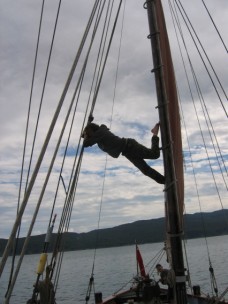
Spar Treatment and Rigging slushes have moved on considerably since that time, to products that will last several times longer. The problem is that we do not know the impact of these products nor the solvents required to thin them that we readily fill our harbours with. Our approach is to use naturally occurring cures (yes, the old ones) unless in specific treatments, where the structure of the boat is in jeopardy (masts, frames). We know there are challenges around large scale manufacture of even naturally occurring crops but Linseed seems to provide a reasonable sustainable solution and doesn’t suffer from the problems of scale that Biofuels do. Any thinking/advice in this respect would be appreciated.
5.PROVISIONING
Organismic veg and transporting with pedal power and trailer. Provisioning for moving one’s life into a 15m wooden box is a big task. Kat and I left ourselves 10 days total. There were high points, the fairly stiff farewell drinks and there was the despair of it all at times!
Much of the transportation was under pedal power including a particularly fraught journey across London carrying oars and 100kg of provisions.
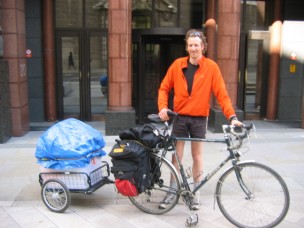
Kath and I sourced all of our perishable stocks from local suppliers who have become good friends too. These are people who understand sustainable produce with respect for the environment and nature. In some cases, contacts Katharine has made through RSPB work with Devon’s most progressive farmers in Land Management. We left with enough local fruit , veg and meat to keep us going for a month or two and with some books on preservation to tackle the ravage of time.
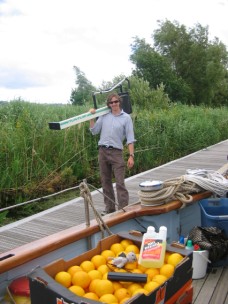
One of a trio of boxes from Gord the Greengrocer’s grapefruits- to stave off the scurvy reported by the Laurie Lowries on their voyage to South Africa. It has been interesting to note that the organic veg has lasted a lot longer than the usual nasty tasteless supermarket carrots people buy! You can find links to their websites in the Links section.
6.WATER CAPTURE
Given the number of crew we have to beg, borrow and steal to crash Lista Light through the highest of seas on long crossings, we need to seek out constant replenishment for our water supplies. We have rigged up a large tarpaulin with a hole in the middle, probably 15sqm which acts as an enormous bra and allows us to harvest the skies when at harbour. It’s not pretty but it does a job. It’s important to let the premier cru go, as the first presse of a tarp can be somewhat rich!
7.WASHING AND GREENFLY
Everyone knows the deal with washing liquids, leaching into the Norfolk Broads and destroying habitat. We know the damage they can do, but yet still they do work superbly well and so they become our guilty pleasures. The difference between a house and a boat is that there is no settlement tanks and processing between source and water coarse. Katharine is the engine room in this respect and I follow her steer. She is fully stocked in Ecover which, despite not managing to kill greenfly in a old pest control recipe, seems to do an ok job on clothes and dishes. (She gave up with disbelief on the fourth attempt at killing greenfly on a plant, borrowed some Ferry Liquid from a neighbour and the lot were nuked in an instant!)
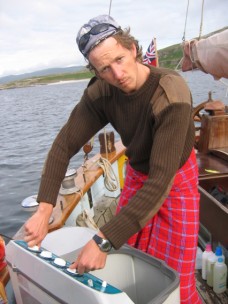
(David- the renegade, Toad of Toad Hall as he flees prison, disguised as a washer-woman). We have a washing machine on board which runs on 30 litres of reclaimed solar heated water and then some inverted 240v power which will be supplied by the renewable above mentioned. We are a long chalk from going nude so this really is the best we can do...!
8.GREENING THE TENDER
We have oars, good old oars! A teaspoon of oil can cover a football field on water so using a 2-stroke outboard, where you mix the oil into the fuel and discharge the resulting exhaust and sludge doesn’t seem like a good idea. We do have a 4-stroke 2HP Honda, but it’s just for high winds when our inflatable gets blown around.
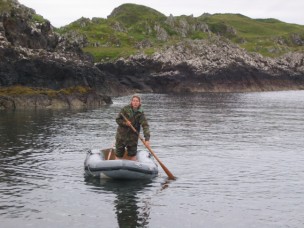
We are planning to get a tender capable of making the trips to do bird surveys under sail - once I have learned the Spanish for that.
9.COOKING and GAS
We are from the northern hemisphere and as such have not only a liking for hot food, but also a need to break down our hardy fibres in potatoes, parsnips and other such lovelies into something slightly more digestible. So we need to cook, and therefore use gas on the boat (We do have a BBQ but we do not have many spare dry planks!) . So frugality seems the best approach.
As always - necessity is the mother of all providers as she has been in this case. Having just started to get to grips with our own, highly parochial UK system of Propane supply (Flogas and Calorgas - homogenous product, same bottle, but never shall the twine meet in terms of filling up each others bottles), we landed in the Isle of Man. Manx Gas. Same gas, different coloured bottle this time, but no chance of a fill up. Ireland - different bottle, same colour, same gas but no way they would fill us up. And as the story continued into Spain, except in spain they actually have different gas! Butane. "Propano?!", exclaims costos, crazy English people he thinks, "No , solo Butan.", oh dear. Having exhausted all possibilities in Galicia involving our crew trailing gas bottles around in the bike trailer, smoking incessantly to test the nerve of passers-by, we have opted to fill our existing bottles with butane and live to see if there is any material difference except for a few millibars of pressure here or there.
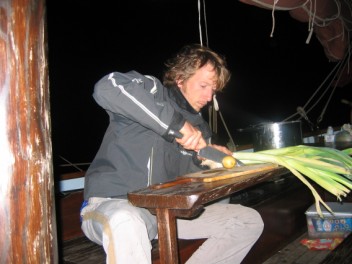
During this process the realization that we would exhaust our supply has led to some good behaviors to take forward. We can use the pressure cooker to minimize time (and also preserve) and to date hasn’t quite destroyed the veg in a way I’m sure my grandmothers used to. It can also withstand a Force 7 without so much as a drip. We have a myriad of recipes for cous cous which only requires a quick soak, and I have invested much time in trying to find a low wattage cooker to run of the inverted Renewables power but so far even the meekest one-slice sandwich toaster takes 750w, in excess of our capacity.
So whatever the weather, wherever in the world, the crew of Lista Light still eat well, even if they don’t always sleep well!
As mentioned we are starting out on this well intentioned voyage to see what alterations we can make to our lives to live in a less impactful way. Some of these ideas will be easy to work with and implement, others will lead us back to the drawing board but with more experience and having had some fun along the way! If you have any old wive’s tales or proven wisdom you would like to add to this section then please to let us know - we will try almost anything!
Topics especially interested in:
- Using reclaimed cooking fat (Biofuel) in the Lister Generator/Perkins engine
- Non-Toxic Antifoul measures
- Permanent Solar Heating fixtures on boats
- Micro carbon capture on diesel exhaust
This page hit Count : 20486
This is the Lista Light Website, for the travels of the sailing boat Lista Light
Click here for text-version of site